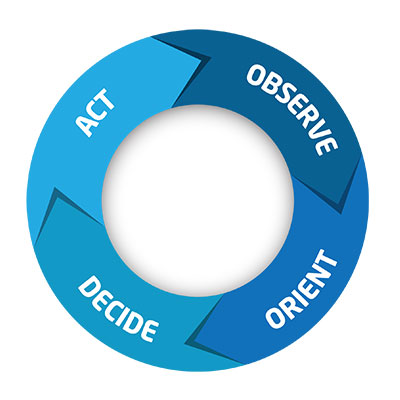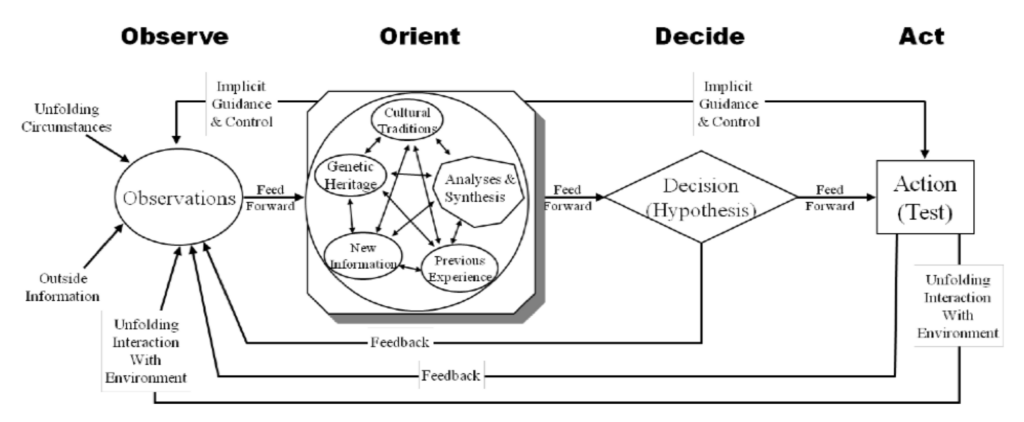Start your day with intelligence. Get The OODA Daily Pulse.
Start your day with intelligence. Get The OODA Daily Pulse.
The OODA Loop is a four step decision making model for winning in competitive environments. Make your decisions by Observing, Orienting, Deciding and Acting and doing so faster than your opponent, in any domain. Do so and you will dominate.
This approach to decision making was conceptualized by retired Air Force Colonel John Boyd in the 1990’s after a study of the history of winning and losing in warfare. It was also certainly influenced by his experiences in the cockpit as perhaps the greatest fighter pilot in the jet age.
The model is so relevant to business we named our site and our network and even our company in honor of it.
Here is more on the model.
OODA Stands for Observe, Orient, Decide and Act. It is called a loop to underscore the continuous nature of decision-making in dynamic, competitive environments.
At a high level, the steps of this process are to:
In a dynamic environment your actions will change the situation, requiring another loop of OODA till the competition is over.

This simplified depiction of the OODA loop is one of our favorites, because it implies continuous decision-making and rapid action. This simplified depiction matches the way Boyd described the OODA loop for the first 20 years after he started using it (see Patterns of Conflict). For many situations this depiction is all that is needed. It reminds architects to build with agility, reminds leaders to continuously watch for changing situations and helps everyone understand that all decisions must lead to action or they are worthless.
But Boyd realized the real concept is not so sequential. In 1996, with the help of Chet Richards, Boyd provided the only sketch he ever made of the OODA Loop. It was not what those who had heard his briefings expected at all. The only OODA Loop Boyd actually drew is:

There are some important reasons for understanding this version of the loop. Boyd made it clearer with this one that observations come from many paths, including, for complex situations, observations on internal status, as well as your own decisions and actions. Guidance on what to observe is also important and comes from multiple sources in a agile organization. Boyd underscored in this version the importance of the Orient step, which is central to this diagram. This orient step involves contextualizing against everything already known, including what is known about mental models so the right method of decisions could be selected. It is individual decision-makers that really do the orienting, but organizations can design to improve this for decision-makers. Decisions too are more complicated in this version. Some decisions are made almost instantaneously, based on implicit guidance, which means in some cases observation the orientation can lead directly to action (if observation leads direction to action that is just a reflex and there is no need for the OODA model there).
Whether the simplified version of the OODA Loop or expanded Boyd version is right for you, one thing is clear, the objective of this model is victory in competitive environments.
Boyd made it clear that none of what he was saying was to be considered dogma, and this is something we should all appreciate. But in capturing the essence of the Observe-Orient-Decide-Act process he articulated something enduring. Successful CEOs are all good at processes like these even if they have not studied them. The same is true of effective leaders in combat. Could it be that Boyd has articulated a universal truth? If evolution of life is based on competition for scarce resources, could it be that competition and the need for OODA like processes is now part of every living thing’s genetic code?
Boyd hinted at this larger connection, writing in Patterns that “Life is conflict, survival, and conquest.” Boyd saw the objective of living things as to “survive, survive on own terms, or improve our capacity for independent action.” He opined that this drove living things to compete for limited resources and is part of our nature as humans.
Think of what this means for you. As an individual, whether you knew it was called the OODA Loop or not, you have been practicing it. Every single time you compete for anything you are observing what you need and want and what the situation is, orienting based on all your experiences, making decisions and, if you are doing it right, taking action.
How is Boyd being applied today? We capture insights into OODA Loop applications in business and military across the site. One example showing relevance to the ongoing Russian war against Ukraine is captured at: John Boyd on Patterns of Conflict and the OODA Loop

Ready for a deeper dive into the OODA Loop? OODA LLC Co-founders Matt Devost and Bob Gourley were honored to have been able to discuss Boyd and the OODA Loop with one of the people there at the creation of the concept, Chet Richards (Chet is the author of the book “Certain to Win”, which is the best book we have found on applying this concept to business environments). We recorded our interview as part of our OODAcast series, which you can watch below:
Our site is designed to improve your decision-making in dynamic environments by providing the information, mental models, decision-making tools and insights that can help you dominate in any competitive situation.
Looking to improve your organization’s ability to leverage the OODA Loop? Here are some additional resources:
Subscribe to OODA
$10
per month
Most Popular
Subscribe to OODA Loop
$100
per year
Apply to Join the OODA Network
$895
per year